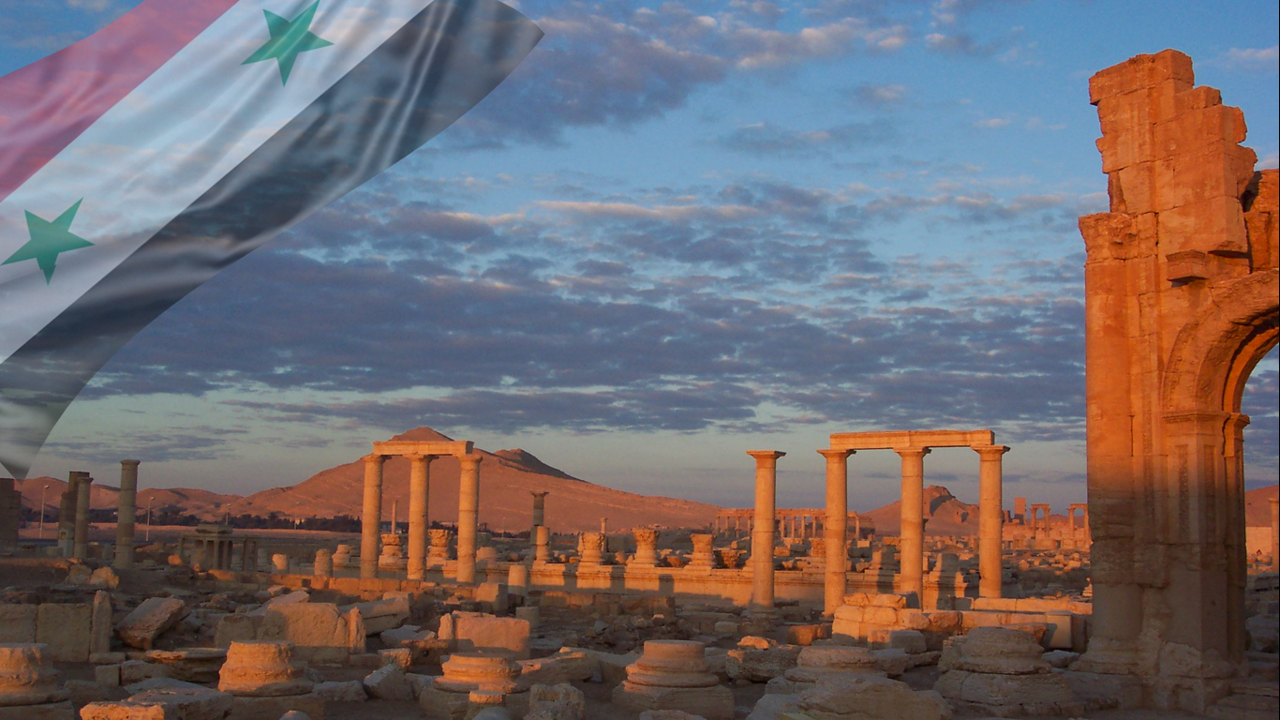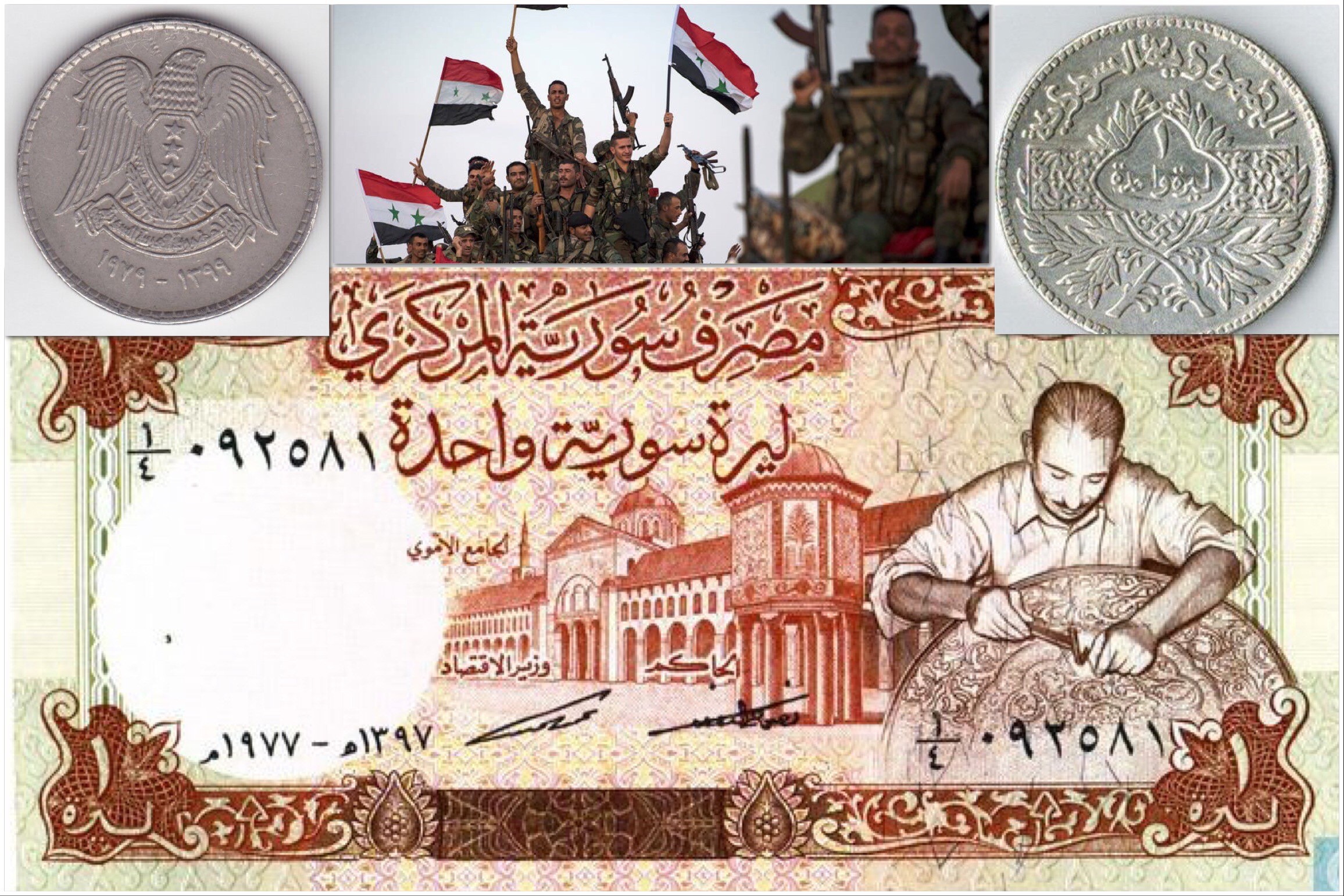The last few, and especially the now passing weeks brought Syrian once again into the limelight. Of course only for those, who are not sank with the details of the “Trump deal”, which faces ever more opposition not only by the Arab League, yet finds supporters like Saudi Arabia and the Emirates, might surprise many, but for long was a clearly visible trajectory. And whatever happens with this deal, the realities on the ground are expected to change little, especially that only this week Netanyahu made surprising inroads to the Arab world.
Yet in Syria the army takes incredible advances against the last stronghold of the formerly so dearly cherished so called “moderate opposition”, a term still upheld by many – mostly Turkish commentators by now – in Idlib. By liberating Ma‘rat an-Nu‘mān on 28 January, the biggest city and once the bulwark of the an-Nuṣra Front in the south of Idlib Province and continuing to the north the Syrian Army cut by supplies to Sarāqib and arrived to the doorsteps of the provincial capital. Also by fierce and ever more vigorous battles managed to push the terrorists from the outskirts of Aleppo. These moves brought the prospects of liberating the two main highways – M4 between Latakia and Aleppo, and M5 between Damascus and Aleppo – crossing the province within reach after long years. A development understandably unnerved all those, who are not interested in the closure of this bloody chapter in the Syrian history. Like Turkey, where President Erdoğan demands the immediate withdrawal of the Syrian troops behind the so called de-escalation zones – which never functioned – and threatens with direct military involvement. Or the White Helmets terrorists, who are preparing for yet another staged “chemical attack” scandal after so many failed attempts. All these, however, now gaining the upper hand, are unlikely to stop the Syrian Army from finally liberating the last terrorist held area.
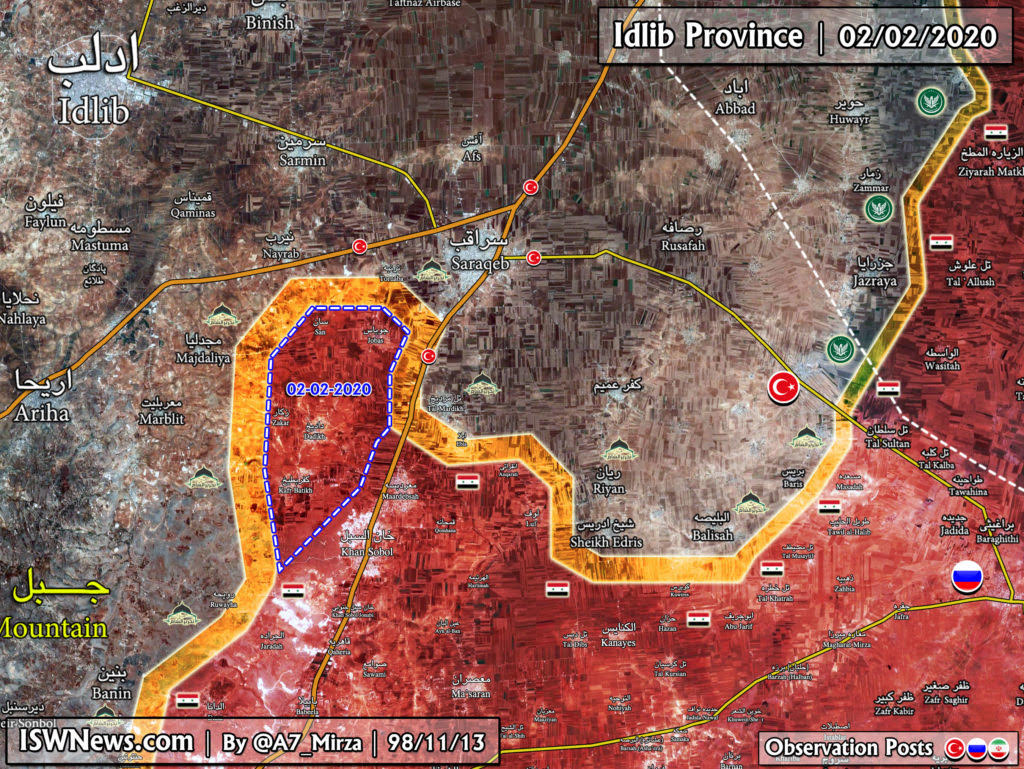
Yet at the same time Syrians are fighting another struggle, one far from the limelight, but in many ways much more important and ways less controversial. A struggle for sanity in these insane times staging true criticism to show that supporting the state does not mean servitude, and a struggle of humanity fighting economical hardship against impossible odds. These matters are in many ways even more important than those of the army, as for all the victories are in vain, if the lessons of the past are not learned, and if the dignity of the ordinary people are lost, for which Syria was so famous for.
One of the biggest names in Syrian politics, the advisor of the President caused controversy with unwise statements, which after all seemed to even come true. But not by her incorrect assessments, but by the surprising generosity and resourcefulness of the ordinary people.
As the West, most especially the US tries to bring Syria onto its knees by economic sanctions and the most blatant sabotage, and while Syrians for years truly expressed criticism for the better of the country, the new slogan is: “Our lira, Our dignity!”
As if nothing: the gains of the army
Idlib is the last remaining biggest territory where the terrorist groups are still standing in Syria, not being directly sheltered by some foreign power, like the Americans in at-Tanaf in the south, or the Turks north of Aleppo and ar-Raqqa. Meaning that this is the last stage of the liberation of the country, which is not completely dependent on foreign relations and the mediation of Syria’s allies.
The last major operation, after several partial gains and failed ceasefires, started on 14 November 2019 , which was halted once again by yet another Russian-Turkish agreement, but was launched again in January. The army showed resolve once again and by 28 January it liberated Ma‘rat an-Nu‘mān. Since than it moved northward along the M5 highway connecting Aleppo and Damascus, while army units started to push the last remaining terrorist pockets out of Aleppo, putting pressure or the collapsing terrorist lines from the north as well. The response was dual. Turkey rapidly intervened and started erecting position around Idlib and Sarāqib, the latter is where the M4 and the M5 highways meet. On the other hand it started to redeploy militants from the areas under its direct control, and in the video here it is clear to see who are manning the lines in Aleppo by now.
And also from where they still get their support.
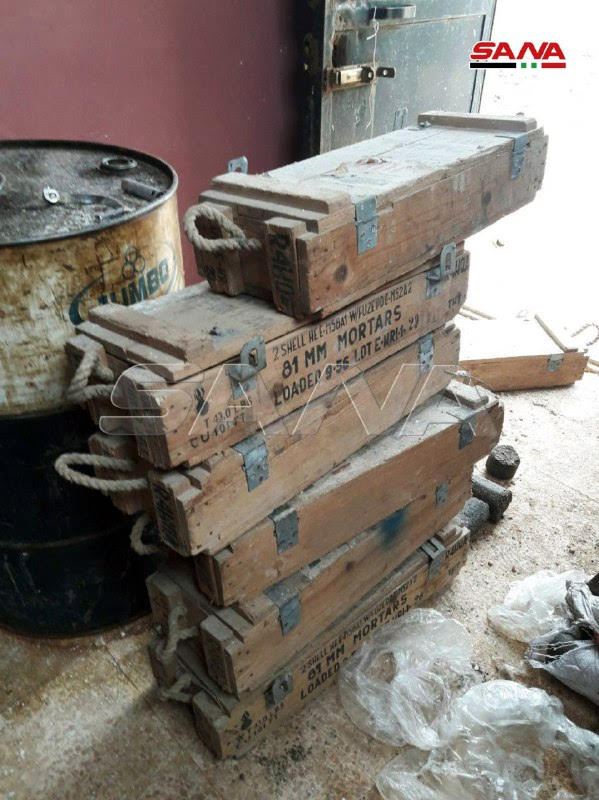
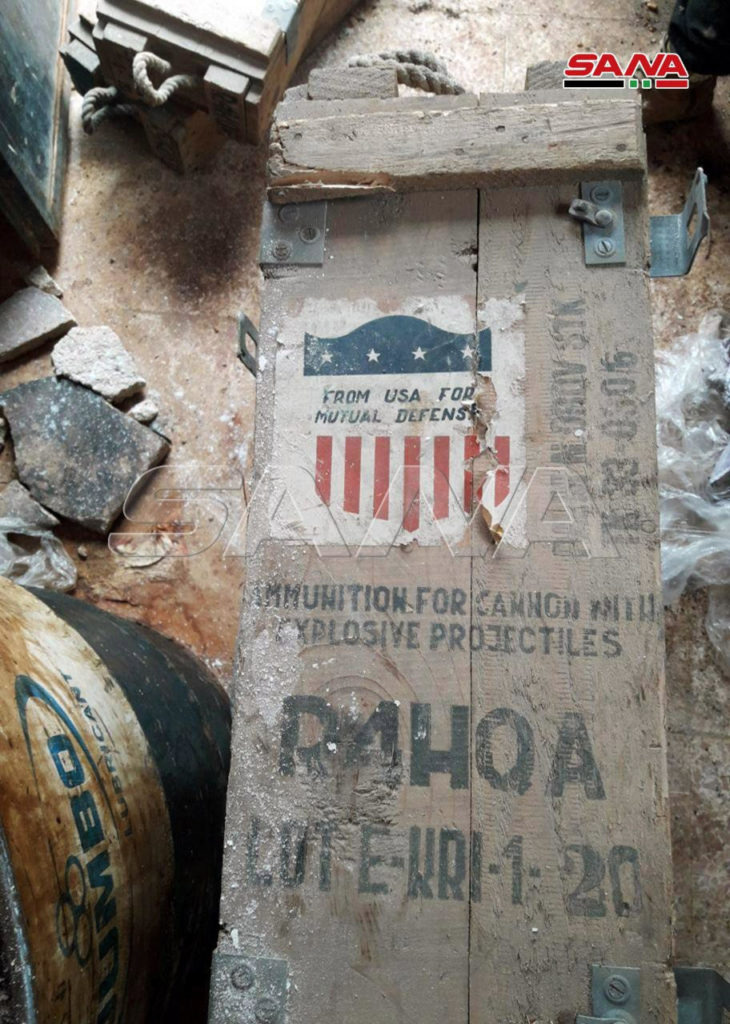
Though many would have guessed a slow push, the Syrian Army showed amazing achievements this week. By the 5 February Nayrab was liberated between Sarāqib and Idlib, making Sarāqib surrounded from three sides. The following day, on 6 February the Syrian Army was in full control of Sarāqib the third biggest city in Idlib Province. Which by now make the M5 highway practically retaken, and putting the Syrian army only to few kilometers from the provincial capital.
The significance of these gains clearly show now, as at the night of 6 February the Israeli forces started shelling the Syrian capital once again, right at the time when Sarāqib was about to fall. At the same night the Turkish army moved in directly and started to take up positions north of Idlib city. The most shocking revelations came a day later, when the it was revealed that the Israeli strike came at the time, when an Iranian airliner was about to land in Damascus airport, risking that if the Syrian Air Defense is about to engage it might shoot down an allied civilian plane with 176 people on board. Have such a tragedy to occur that would have ruled the news completely draining attention from the Idlib operations and would have probably even halted it, as the Syrian Central Command would have been forced to deal with matter. The Turkish move, however, can also not be degraded, as already on 2 February the Turkish forces at an observation post at Idlib opened fire on the Syrian forces and the Syrian response was an artillery barrage that left 6 Turkish soldiers dead. Since than Erdoğan claimed that Turkey hit back heavily, but this was refuted by both the Syrians and the Russians. With more direct involvement the chance of direct Syrian-Turkish clashes are high. But the Syrian Command clearly stated that does not stop the operations and indeed it is more of a comic scene now, that as the Turks put up new positions they are surrounded by the next day. By now the number of the surrounded Turkish observation posts are between 5 and 8 depending on the sources.
The changing realities are clear, as during the last month or so Turkey started shipping militants from Syria to Libya, and they started to flee in fear of being transported to there. It seems that the redeployment is not going fast enough, especially that it became known and the Libyan peace process failed. From here comes the fear for Turkey, as some Turkish analysts now clearly state, that these might be pushed in mass to Turkey. And here comes the dilemma: what to do with them? Until this question is somehow answered Ankara tries to keep these terrorists groups on the ground, which is proving to be ever more difficult. Looking at the progress now the Syrian Army might liberate the city of Idlib with a week or two, and might even most of the province before April. Would Turkey to wished to stop this now, it would have to face Russia.
And that is where the Syrian Army standing now:
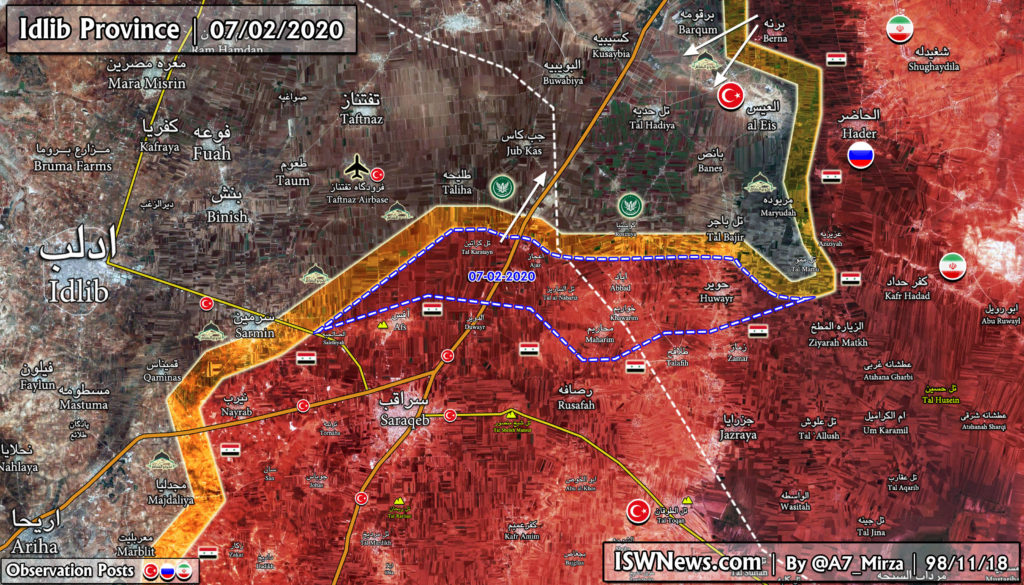
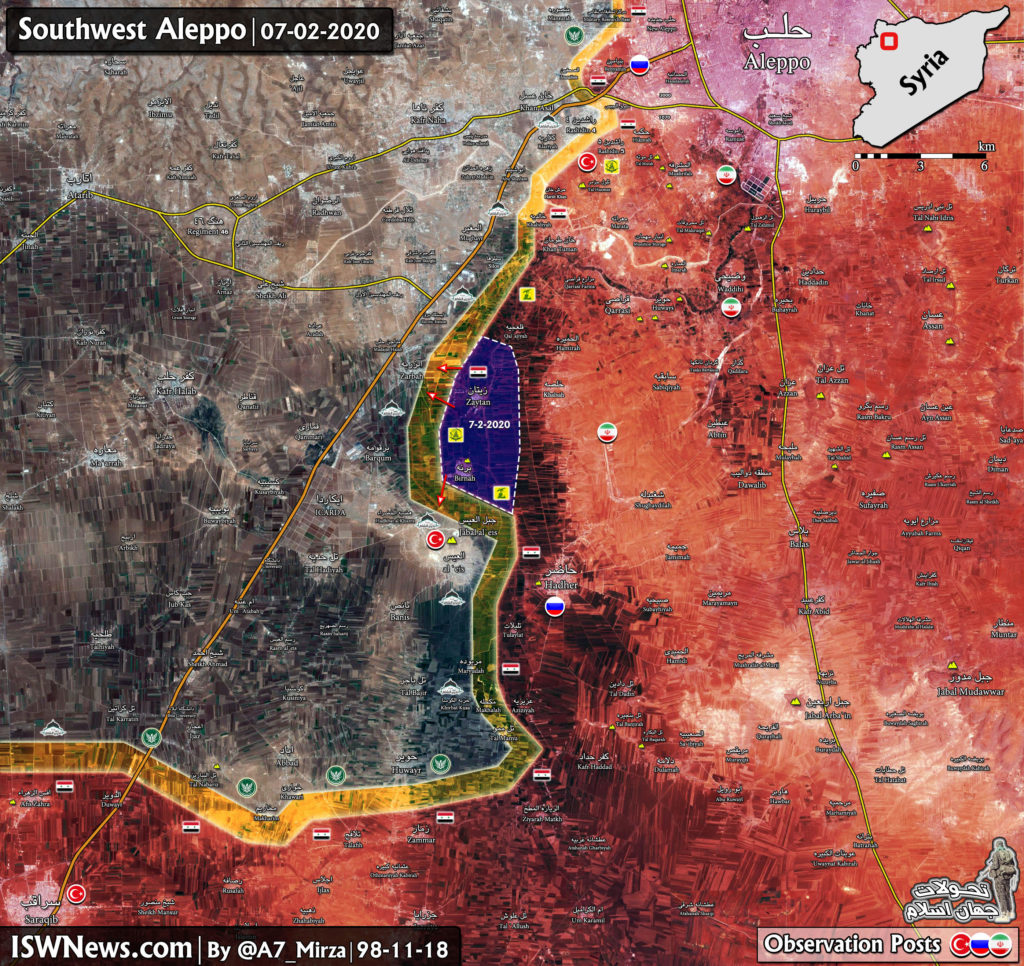
Unwise statements
All these gains were, however, preceded by one truly foolish statement in an interview by none other than Butayna Ša‘bān. The name might not bring many bells, only for those, who know Syria better, but indeed this lady is one of the most influential politicians for long in Syria. She was once the personal English interpreter of late President Ḥāfiẓ al-Asad, than she became almost as a mentor for the President Baššār al-Asad and took the role of Presidential Political and Media Advisor. That might seem as insignificant, but during the years she was probably the most interviewed Syrian politician after the President and the Syrian U.N. envoy, Baššār al-Ğa‘farī, even in the Arabic press. She was one those who appeared in the first sanctions against Syria in 2011 by the EU, so even before Washington started its rounds of sanctions. Indeed her position does not reflect well her true role, as she was and still is one of the most vocal voices of the old guard, and the principals of the Ba‘at Party, upon the current Syrian state was built on. While by many analysts in the West having a – rare – favorable opinion about Syria adore her, she was always a more controversial figure, as many ordinary people viewed her hypocritical.
These contradiction reached a new height with an interview to the Lebanese al-Mayadeen channel’s Lu‘bat al-Umam – Game of Nations[1] – on 25 December 2019. In this interview she touched many of the most pressing issues of the current Syrian realities in her usual style, when the questions reached the economy. Especially the matter of the Syrian Lira’s – officially Syrian pound, within Syria called Syrian Lira – exchange rate against the US dollar, which was drastically dropping in the last few weeks, a consequence of the Lebanese turmoil and the closure of the borders with it. That caused the price of certain commodities to skyrocket, and once again the worsening exchange rate fostered the black market. On this matter she said: “… these are the equations of the exchange companies… really… now one tells you it became 850, you go to the market, no one sells in 850, nor he would buy. These are all talk on paper in reality and has no connection to the realities of the Syrian economy”
These are very strange statements as by that time the real exchange rate was close 1000 SYP/1 USD, so truly no one would have exchanged by 850 as the rate already passed it. But the more pressing point is that, like many other regional countries suffering from American economic war, Syria restricts the use of foreign currency. That makes it illegal to use internally anything else than the national currency, and to buy or sell apart from the official rate, which was somewhere between 450 and 500 at that time. So the even more pressing reason why no one would – in theory – exchange dollar in such a rate is that it is illegal. Not that it does not happen, but that is penalized. Almost a month later, on 18 January 2020 it was announced that the President issued “Executive Degree #3 of 2020” further penalizing all engagement in foreign currency not less than 6 years of prison. These statements might have effect abroad, but are rather sarcastic from such a high ranking state official. Yet she continued for the worse: “Well, I meet with colleagues, meaning with economic officials and they told me that the economy 50 times better, than it was in 2011. The reality of the economy, yes, it is better than before the beginning of the crisis”.
Well, that might be true in statistical terms, however, with a severely damaged infrastructure, economic sanctions, highly narrowed trade opportunities and tightly centralized economy, not to mention the huge loss in human lives, these words come as rather insensitive to the daily struggles of the people, most of whom truly support the government. Not surprising that many felt these statements as a sort of dark humor, and the social media suddenly became full of jokes and sarcastic comments about Ša‘bān herself.
This is not something rare, or even surprising as, unlike it is many ties portrayed in the West as more like “wishful thinking”, as many Middle Eastern societies do know and engage in criticism towards their respective governments. The misjudgment usually comes, when these are interpreted as general dissatisfaction against the state itself. The examples for these not only in the case of Syria, but also in so many Iranian example are very vivid. As we will see, these critical voices do not mean that the people in general are not in support of their country and state. But these notions are important to point out, since it signals that after all the struggles and sacrifices a good portion of the population refuse to handle the current realities in a black-and-white manner, in which one is either in support of the armed groups, or in blind support of any state official, no matter how incapable things they say. And that is a necessary and healthy development, especially in light of the later details, as indeed even before 2011 the old political elite lost connection with a good portion of the society, which grew tired of the old slogans. If the society and the state management is to rejuvenate to a more inclusive manner than such responses are imperative.
Voices not unheard
Soon enough it became clear that even in the most upper circles of the state administration criticism was heard. Though responses signal a rather mixed result, it is clear that the old ways can be tackled and healthy criticism is not without benefit.
Ša‘bān herself did not take the pressure well, and that should signal the gradual downfall of the old guard, but at least of the old approaches. She soon reacted that she did not mean the livelihood, only the general state of the economy, which is – according to her assessment – indeed better. Once again, that might be the case. But from the very person, who gives advices to the President himself, and especially on the field of communication and public relations, this is nothing short of a scandal. The very person, whose sole role is to know how to talk to the people and to the outer public, should not give statements, which later has to be clarified, explained and possibly even corrected. To which she is still not capable.
On 18 January 2020 the “Executive Degree #4 of 2020” was also issued, which increased the punishment for spreading lies, or false informations on the social media, or if someone shakes the national general trust and public order and expresses defamatory criticism. Many obviously saw that as a desperate attempt to defend Ša‘bān’s stature. Which did not really work, as most people just got tired of the story, but the law had no effect on this particular case. It is significant, however, that no single state official came to her defense, which probably prompted Ša‘bān to respond personally, though not to her biggest benefit.
The fact, however, that no major official came to her defense about the statement, and only one mild, loosely enforced attempt was done to correct the harm done might just signal that the criticism was heard and understood in the upper layers. Hopefully that may lead to a more conscious attitude by some of the less impeccable Syrian state officials. However, faith chose to respond to Ša‘bān’s words, almost as she was correct. And that is where not only the Syrian people, but the Syrian Lira also should its surprising worth.
Our lira, our dignity
Economic realities are grim now in Syria. It was hoped that the opening of the Iraqi border might also open trade opportunities and somewhat betters the situation, but the heavy tariffs and the uncertainties on the main highways in the east of the country turned expectations to the bitter. All was worsened by the recent outbreak of the Lebanese protests, which lead authorities to close the border from time to time. By the Lebanese Central Bank’s decision to freeze payments is dollar the Syrian Lira’s exchange started to skyrocket once again, since many Syrian savings were in Lebanese banks. On the outbreak of the crisis in 2011 the about 50 SYP was $1, but eventually that dropped and by early December 2020 it arrived to some 950 SYP. That naturally pushed up the prices, as many commodities come still come from abroad, but by secondary effects it started to hit even domestically produced items. Which somewhat narrowed even the inner trade, as the market rapidly shrank.
The government is not entirely blind to the situation, as it subsidizes the most essential commodities. By the so called “Smart card” – by official name Takāmul – system families – bigger families the most – can by the most essentials to a certain amount in a much cheaper price. The system introduced was gradually introduced in 2014 and is now taking effect, as even local ordinary traders are now pushing down the prices to keep in business. The people, however, and that is where the real Syrian valor showed itself once again, responded in another way, most ingeniously.
It all started in the central city of Ḥimṣ in late January, where a trader started to sell vegetable crates for only 1 Syrian Lira. The trick is the offer was specifically for the 1 SYP coin, which is practically out of use since 2005. It was never officially revoked, but went out of circulation, especially after the rapid price shocks in 2013, an only mementos left with families. Soon, however, these were unearthed and the demand for them grew rapidly.
The offer was a huge success and the example caught on. Very soon not only other traders in Ḥimṣ started similar offers to locally made commodities to stimulate trade, but the “program” spread to other provinces fast, even down to the capital. Facebook groups were created, the biggest ones are the “Līratnā ‘Izzatnā (Our Lira is Our Dignity)” and “Līratnā ‘Izznā (Our Lira is our Dignity)” – thought there are several similar ones -, where people offer special deals for limited times for only one 1SYP, or on very low prices. This not only include basic commodities like vegetables, or fruit, but all kinds of products from cellphones to light bulbs, even to services like language classes. Soon enough even major companies like the Syrian Tobacco Factory, or SyriaTel joined.
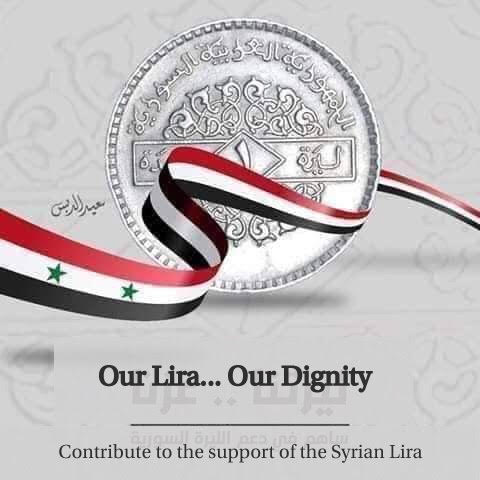
In many ways that might seem little, but in fact even in the limited time this campaign has started the livelihood in many areas became jut slightly better. Not to mention the huge moral impact. The hope it gives that the tides can be turned. After all, in our digital age a power of a currency is just as strong as the trust people put in it, especially in such isolated economies.
How is that turns back to patriotism? Well, one just has to visit these groups to find the huge solitary amongst the people, where people even call upon each other to offer blood in areas close to the front lines, like Aleppo, or to help families. The responses are strikingly powerful. And if one would mistake this as anti-government current to challenge the state economy, he only as to see the amount of pictures about the President, the First Lady and the army – and even more the comments – to see that this is not the case.
Can that be a game changer?
Indeed many economists would argue that such attempts are insignificant as they cannot change realities. They could easily explain that even in highly controlled economies like the Syrian outer effects cannot be excluded. If sanctions kick in and the prices in foreign trade go up – partially due to the blackmarket – than prices will go up even for domestically produced items, as foreign currency start to leave the state. That is exactly what happened to Syria in the past few years, and of course examples are many. So even if the people would be willing to trade in extremely low prices that does not change the prices of products that have to be brought in from abroad. In the last few years that meant a huge range of item, even including fuel. Regardless the fact that Syria is an oil rich country, at least to the level of self support, in the years of the crisis most oilfields were inaccessible and Dā‘iš was selling the Syrian oil. By now in large parts the American army replaced them (https://amaraia.com/hu/washington-eldontotte-hogy-ket-uj-katonai-tamaszpontot-epit-kelet-sziriaban/), with cordial Saudi support. Meaning that much of even the basic energy resource was brought in by allies like Iran, and electricity was scarce, halting production. So it seemed there is no way out.
Realities, however, somewhat changed in the last few months. The Syrian Army managed to retake much of the areas in the East, and regardless the blatant American theft, the Syrian state retook several major oilfields. Moreover, the biggest electrical plans were also retaken (https://amaraia.com/hu/a-szir-erok-visszaallitottak-ellenorzesuket-az-eufrateszre-epult-tisrin-eromu-folott/ ) and production started once again. With the basic needs re-secured once again, production can start. Syria was a largely self-supporting state before the crisis, which make this a possibility. The other main obstacle for traders, especially in the agricultural was the narrowed market, since all tries to limit purchases at time of incredible prices. This “one lira” campaign breaks exactly this deadlock, and even if in a low and local level, it can stimulate the economy.
The government somewhat supports this current now, as it offered “beneficial prices” – 700 SYP/USD, instead of the 435 until now – for limited time without punishment for the exchange of the dollar. Though still worse than the blackmarket realities, at least some official channels were opened for a more acceptable exchange, which if all goes well, can boost the foreign currency reserves of the state. Right at the time, when economic possibilities are improving, if only by little.
Surely that cannot be a magic cure to the chronic state of the Syrian economy, but already it produced miracles.
Valor and dignity
One can mock such “one Lira” campaigns as noting significant. As the only Western article about this, a report on BBC Arabic tried to humiliate it and mask it as an anti-government movement. But how many such examples can be listed from the last hundred years from war and crisis stricken countries, where ordinary people took the initiative from the state and started to curb down prices by offering special deals? By offering personal sacrifices and putting their faith in a highly degraded currency. Can many be listed?
Is it surprising that no reports can be seen in the Western media about this almost heroic selflessness? Though reports about the plunging exchange rate were many. This is not the first time Syria and Syrians in general surprising the world, against all impossible odds.
After all, who would have betted in 2012 that the Syrian state would stay standing? Or even two years ago that the East and Idlib can be liberated?
[1] A once highly popular weekly debate program hosted by legendary journalists Sāmī Kulayb, which since his resignation from the channel lost much of its charm.

